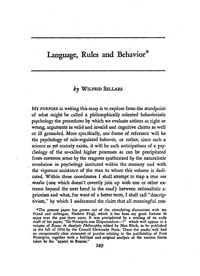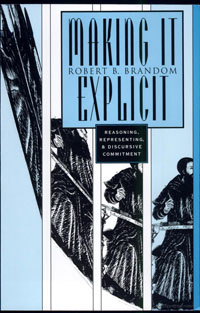About
|
Normativity of Meaning: Sellarsian Perspectives Prague international colloquium organized by the Department of Logic, Institute of Philosophy The colloquium continues the series of annual international meetings organized in Prague by the department. The present colloquium aims to bring together the legacy of Sellars’ ideas with other current philosophical discussions on the question of the normativity of meaning. However, contributions do not need to focus solely on this exact issue; we welcome any submission addressing normativity and/or meaning related to a broadly Sellarsian framework. The invited speakers of the colloquium are Robert Brandom(Pittsburgh), Michael Williams (Baltimore), Christopher Gauker (Cincinnati) and James O'Shea (Dublin).
The conference fee is EUR 80 (covers participation, refreshment, book of abstract & banquet). A possibility of accommodation (a limited number of rooms) will be available directly at the conference site. The submission of abstracts is closed by now. |

Wilfrid Sellars is now – belatedly, but firmly – being recognized as one of the deepest and most outstanding philosophers of the twentieth century. Of key importance was his originality in giving pride of place to 'the normative'. In fact, he took everything that was not in the direct purview of natural science (everything, that is, which constitutes our 'manifest image' of the world in contrast to the 'scientific image') to be of a normative nature. Normativity, in his view, thus penetrates the whole of our specific
 ally human affairs: it enables us to perceive ourselves not only as moving organisms, but as acting persons, pursuing our personal aims, deliberating, setting ourselves goals and being able to hold ourselves responsible for our actions. Normativity also lies at the heart of semantics: meaning ascriptions are, according to Sellars, essentially normative utterances. Sellarses approachy to semantics has been further elaborated by his followers, notably Robert Brandom. This conference aims to bring together the legacy of Sellars’ ideas with other current philosophical discussions on the question of the normativity of meaning. However, contributions do not need to focus solely on this exact issue; we welcome any submission addressing normativity and/or meaning related to a broadly Sellarsian framework. ally human affairs: it enables us to perceive ourselves not only as moving organisms, but as acting persons, pursuing our personal aims, deliberating, setting ourselves goals and being able to hold ourselves responsible for our actions. Normativity also lies at the heart of semantics: meaning ascriptions are, according to Sellars, essentially normative utterances. Sellarses approachy to semantics has been further elaborated by his followers, notably Robert Brandom. This conference aims to bring together the legacy of Sellars’ ideas with other current philosophical discussions on the question of the normativity of meaning. However, contributions do not need to focus solely on this exact issue; we welcome any submission addressing normativity and/or meaning related to a broadly Sellarsian framework. |



